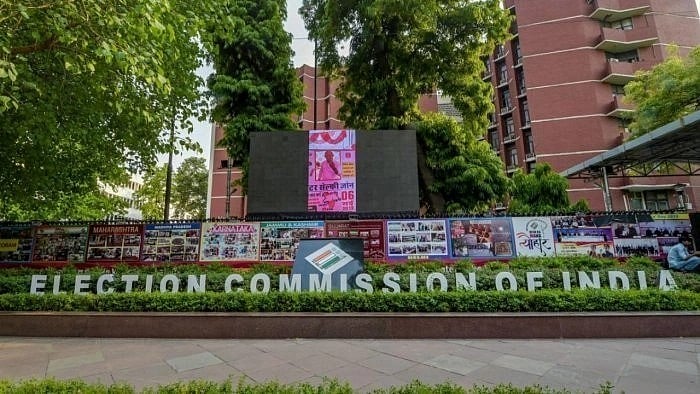
Office of the Election Commission of India.
Credit: PTI File Photo
Earlier this month, the Election Commission of India (ECI) began a series of meetings with presidents and heads of national and state political parties, the gravitas of which went unnoticed amid the compelling developments on the border. However, observers will not miss the importance of the development. Heads of five out of six recognised national parties already had their interactions with the EC and meetings with around 60 state-level parties are in the pipeline. The meetings are reported to be without any specific agenda, allowing political parties to articulate their thoughts.
These apex consultations were preceded by over 4,700 all-party meetings with Electoral Registration Officers (EROs), District Election Officers (DEOs), and Chief Electoral Officers (CEOs) of states in which over 28,000 representatives of political parties took part. These exercises can potentially put the pan-India election machinery on alert even in a non-election period. The attention of political parties often requires to be guided to the relevance and inevitability of the decentralised election architecture from the Booth Level Officer (BLO) upwards. An example is the small fact that names in the electoral roll are added or deleted by the ERO and the appeal against any discrepancy lies with the DEO and then with the CEO. The EC may not have direct jurisdiction here.
In this pursuit, the EC has for the first time commenced training of political party workers associated with the conduct of elections – the booth level agents (BLAs). They are being clarified about their roles and responsibilities under various election laws so that they can protect their party interests better within the available formats. The outcome of this initiative will be interesting to watch.
The EC top brass meeting political parties is not unusual but generally, it is timed with the elections, when political parties tend to approach the Commission with their grievances. Considering the short timeframe in which redressal is sought, and the immediate implications, responses and rejoinders can tend to be volatile even when wrapped in constitutional courtesies. There can be a tendency to find external scapegoats for electoral reverses. During the 2024 Lok Sabha elections and subsequent assembly elections in Haryana, Maharashtra, and Delhi, institutional and statutory decisions faced slander and personal attacks. As political battles intensified, election managers increasingly faced the ire from certain quarters, while they were only enforcing the law book.
Against this background, the current series of interactions look to serve a purpose, addressing a “long-felt need of constructive discussions” in the words of the EC for “further strengthening the electoral process”. In a larger context, these need to be seen as cementing a bridge that is valuable for the functioning of India’s electoral democracy.
Towards reform
All-party meetings at the behest of the Commission have been few and far between. These were called on broad issues like Electronic Voting Machines (EVM), use of money in elections, criminalisation of politics, and paid news; the one in 2023 was on the possibility of remote voting for facilitating migrant voters. These meetings, while being ideal propositions, can get debilitated by rigid and hostile positions. Elaborate, separate meetings with major political entities can help reduce communication gaps between them and the poll regulator on key concerns and pave the way for reforms.
While the dialogue is being advanced, a simultaneous emphasis on the legal framework is visible – a framework that is layered through constitutional provisions, the Representation of the People Act, Conduct of Election Rules, pronouncements of constitutional courts, and meticulously codified procedures. There appears to be a tactical de-escalation of the aura of discretion in election management. The job of the election managers is to ensure the rule of election law in dealing with all stakeholders; it does not matter if it is to anyone’s advantage or disadvantage.
As parliamentary delegations fan out to place India’s perspective before the world regarding the recent cross-border conflict, a major fortification of the nation’s superior moral strength – compared to the adversary – comes from the undiminished democratic character of its polity.
Besides the ordinary voter of India, two entities that have contributed to this democracy capital are the political parties and the EC, in their different roles. The Commission has identified as many as 28 stakeholders in the overall electoral process, but the position of political parties is the most unique. The relationship between the two has to be of continuous trust. There are complex and heavy agendas ahead: delimitation of constituencies, women’s reservation, and the proposal of one nation one election (ONOE). The dialogue must continue and in earnest.
(The writer is a former director general, Election Commission of India)